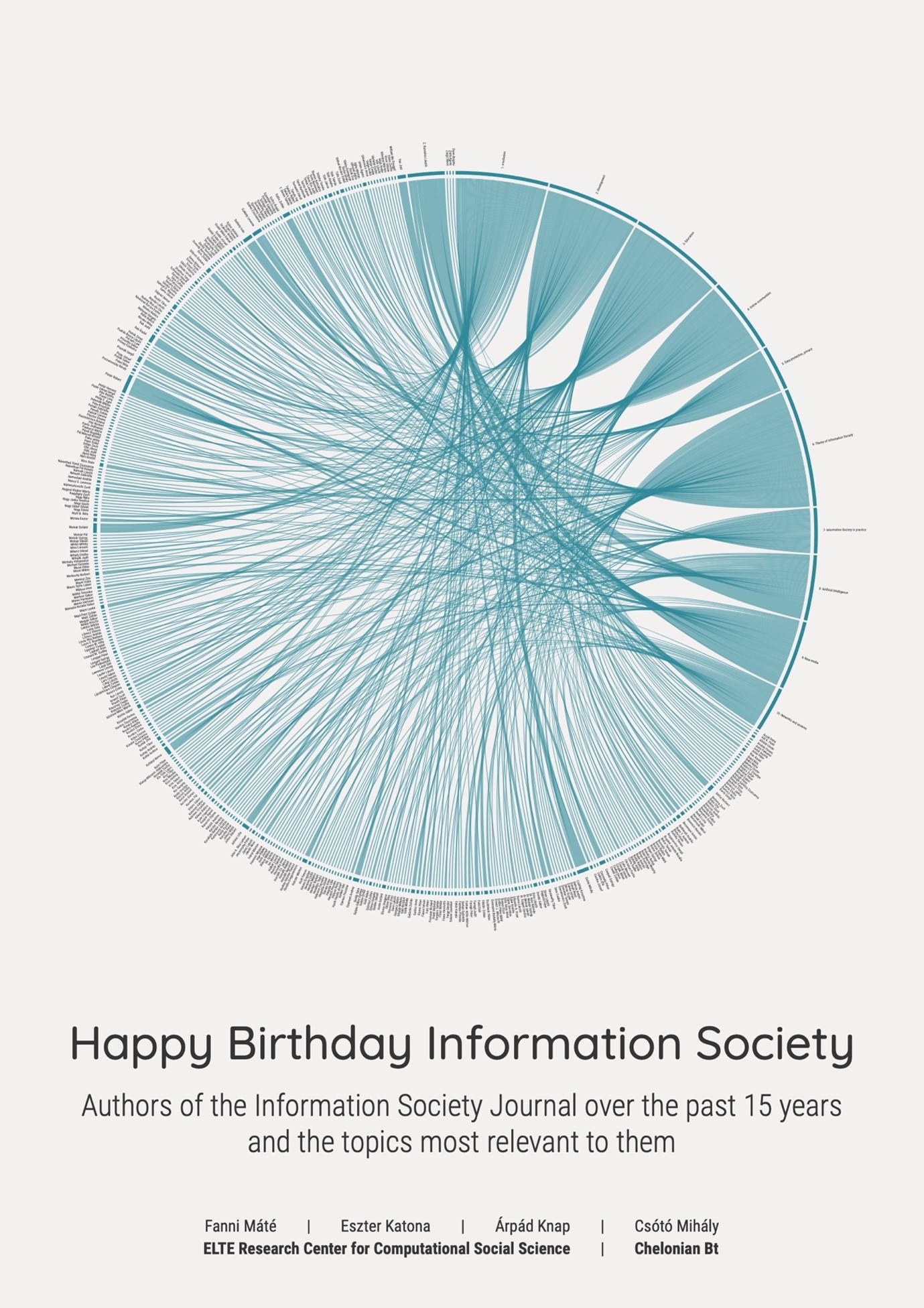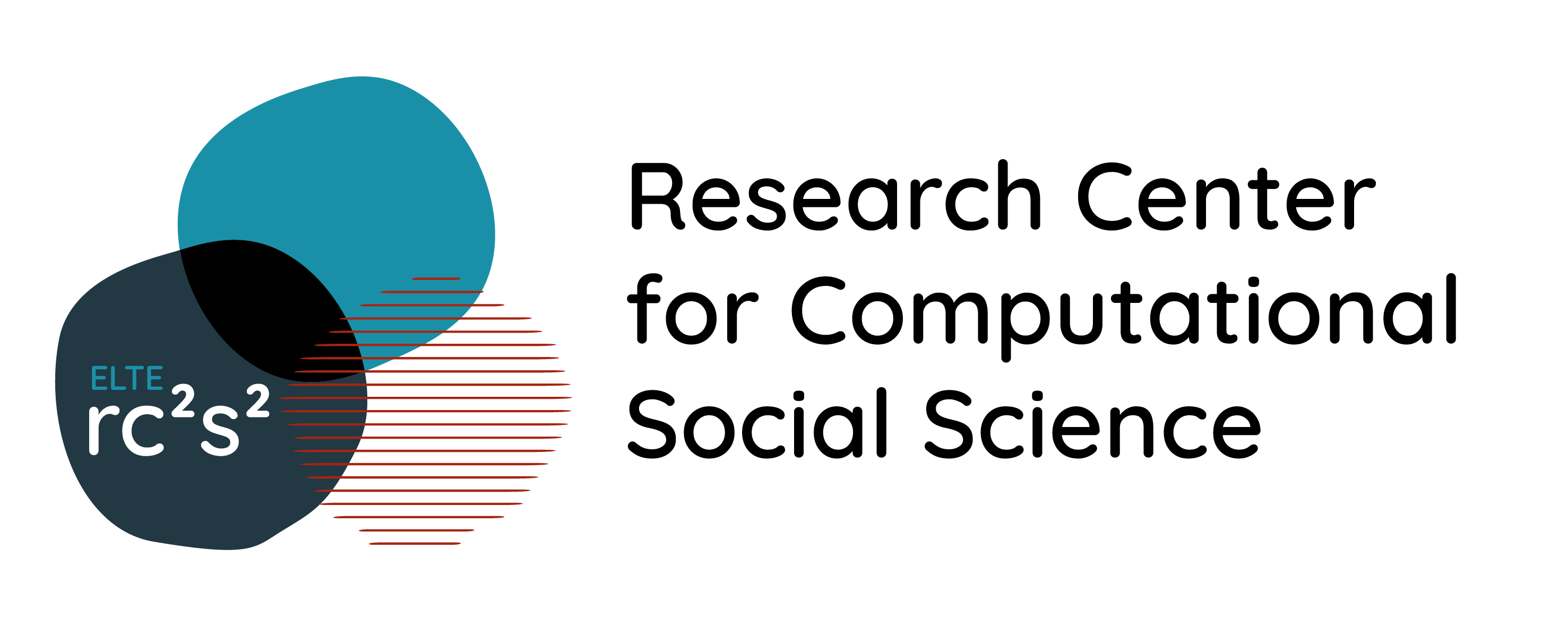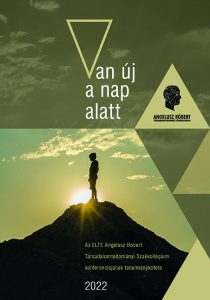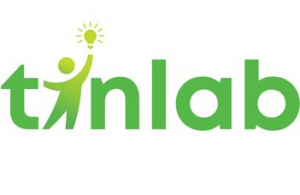Zsófia Rakovics presented her research results entitled “Analysis of migration discourses based on parliamentary speeches” at the Hungarian Sociological Association’s annual meeting between the 14th and 15th October, 2022 (hosted by the University of Miskolc). The presentation was part of the ’Challenges of international migration’ section.
Eszter Katona and Mihály Fazekas gave a presentation at the Hungarian Sociological Assocation’s annual meeting
2022.10.15. Presentation Corruption in Online Editorial MediaEszter Katona and Mihály Fazekas (CEU) presented their research results entitled “Identifying competition restrictions as a corruption risk in public procurement procedures using natural language processing” at the Hungarian Sociological Association’s annual meeting between the 14th and 15th October, 2022 (hosted by the University of Miskolc). The presentation was part of the ’Quantitative methodological innovations’ section.
Renáta Németh gave a presentation at the Hungarian Sociological Assocation’s annual meeting
2022.10.15. Presentation The layers of political public sphere in Hungary (2001–2020)Renáta Németh presented her research results entitled “The role of domain knowledge in social research applications of data science” at the Hungarian Sociological Association’s annual meeting between the 14th and 15th October, 2022 (hosted by the University of Miskolc). The presentation was part of the ’Quantitative methodological innovations’ section.
Zsófia Rakovics and Márton Rakovics gave a presentation at Text.Machine.Society conference
2022.09.20. The layers of political public sphere in Hungary (2001–2020)Zsófia Rakovics (ELTE RC2S2) and Márton Rakovics (ELTE RC2S2) gave a presentation at the Text.Machnine.Society conference (organized by ELTE RC2S2) entitled „Analysis of parlementary speeches with document embedding” on 20.09.2022.
Renáta Németh gave a presentation at the Text.Machine.Society conference
2022.09.20. The layers of political public sphere in Hungary (2001–2020)Renáta Németh (ELTE RC2S2) gave a presentation at the Text.Machnine.Society conference (organized by ELTE RC2S2) entitled „Researching language polarization with NLP: methodological challenges based on a scoping review (generalizability, role of domain knowledge, mixed methods, causal inference)” on 20.09.2022.
Árpád Knap, Tímea Emese Tóth and Ildikó Barna gave a presentation at Text.Machine.Society conference
2022.09.20. The layers of political public sphere in Hungary (2001–2020)Árpád Knap (ELTE RC2S2), Tímea Emese Tóth (ELTE RC2S2) and Ildikó Barna (ELTE RC2S2) gave a presentation at the Text.Machnine.Society conference (organized by ELTE RC2S2) entitled „Emotions in the word embeddings of articles about Trianon Peace Treaty and the Holocaust, and possible tools for automated emotion detection” on 20.09.2022.
Jakab Buda, Bori Simonovits and Renáta Németh gave a presentation at Text.Machine.Society conference
2022.09.20. The layers of political public sphere in Hungary (2001–2020)Jakab Buda (ELTE RC2S2), Bori Simonovits (ELTE PPK), Renáta Németh (ELTE RC2S2) gave a presentation at Text.Machine.Society conference (organized by ELTE RC2S2) entitled „Official discrimination? – Measuring attentional discrimination using natural language processing” on 20.09.2022.
Jakab Buda – Renáta Németh – Bori Simonovits – Gábor Simonovits: The language of discrimination: assessing attention discrimination by Hungarian local governments
2022.09.14. Publication The layers of political public sphere in Hungary (2001–2020)Jakab Buda, Renáta Németh and co-authors published their results in Language Resources and Evaluation (D1).
Buda Jakab, Németh Renáta, Simonovits Bori, Simonovits Gábor: The language of discrimination: assessing attention discrimination by Hungarian local governments
2022.09.14. Publication A politikai nyilvánosság rétegei Magyarországon (2001-2020)Megjelent Buda Jakab, Németh Renáta és társszerzőik publikációja a Language Resources and Evaluation (D1) hasábjain.
Report about the Módszeresen workshop
2022.08.24. Presentation Data Science in Social ResearchÁkos Szigeti’s (NKE) report has been published about the workshop examining the sociological perspective of data mining. Ildikó Barna, Renáta Németh (opening lecture) and Domonkos Sik participated from us; the workshop was the Módszeresen series’ ninth episode, the series’ main organizer is Renáta Németh.
Eszter Katona at the ICSA conference
2022.07.18. Presentation Corruption in Online Editorial MediaFollowing a previous presentation, Eszter Katona, a member of our research group, was invited to the ICSA (International Conference on Sustainability Analysis) conference on 15.07.2022. The panel is entitled “Challenges and recent advancements in corruption risk assessment”. Eszter presented her research with her co-supervisor, Mihály Fazekas.
Eszter Katona, Mihály Fazekas (2022): Hidden barriers to open competition: Using text mining to uncover corrupt restrictions to competition in Public Procurement
2022.07.15. Presentation Corruption in Online Editorial MediaFollowing a previous presentation, Eszter Katona, a member of our research group, was invited to the ICSA (International Conference on Sustainability Analysis) conference on 15.07.2022. The panel is entitled “Challenges and recent advancements in corruption risk assessment”. Eszter presented her research with her co-supervisor, Mihály Fazekas.
Rakovics Zsófia (2022): Demonstrating potentials in the application of the Temporal Positive Pointwise Mutual Information (TPPMI) temporal word-embedding model – The change in meaning of the words in the prime ministers’ speeches
2022.07.03. Publication The layers of political public sphere in Hungary (2001–2020)Zsófia Rakovics’s new publication is out now which is published in the new compilation ’Van új a nap alatt’ from Angelusz Róbert College for Advanced Studies. In relation to our OTKA research, the paper can be accessible in Hungarian.
ELTE-TINLAB workshop
2022.06.27. Presentation Discursive framing of depression in online health communitiesOn 22nd June our ELTE-TINLAB research team hosted a workshop titled ‘Online lay depression discourses – research summary and recommendations by the ELTE-TINLAB depression forum research team’, inviting professionals involved in health care and e-mental health.
Our research last semester was based on two questions: How are the online depression forum discourses affected by the covid? And, from a sociological perspective, how do these forums serve as agents of socialization?
The members of the ELTE-TINLAB depression forum research team:
Principal investigator: Domonkos Sik
Senior researcher: Renáta Németh
Researchers: Jakab Buda, Márton Rakovics, Bendegúz Zaboretzky, Eszter Katona
Clinical consultant: Máté Kapitány-Föveny
Our project is supported by the Social Innovation National Laboratory (TINLAB), NKFIH-875-4/2020
Zsófia Rakovics, Márton Rakovics (2022): Semantic evolution of words in Hungarian PM Viktor Orbán’s speeches using a temporal word embedding model focusing on the issue of migration
2022.06.22. Conference poster The layers of political public sphere in Hungary (2001–2020)Zsófia Rakovics and Márton Rakovics will display the results of their research entitled “Semantic evolution of words in Hungarian PM Viktor Orbán’s speeches using a temporal word embedding model focusing on the issue of migration” at the poster section of the 8th International Conference on Computational Social Science IC2S2 (The University of Chicago Booth School of Business, Chicago, IL, USA), July 19-22, 2022.
Domonkos Sik (2022): Populist Juggling with Fear – the Case of Hungary
2022.06.11. Presentation The layers of political public sphere in Hungary (2001–2020)Domonkos Sik gave a presentation entitled “Populist Juggling with Fear – the Case of Hungary” at The End of “Freedom” in Central and Eastern Europe? Addressing the Challenges of an Illiberal Turn (9-11. June 2022) conference organized by Andrássy University Budapest.
Eszter Katona (2022): Corruption risk in public tenders: using text mining to detect restrictions on competition
2022.06.03. Presentation Corruption in Online Editorial MediaEszter Katona gave a presentation at the annual conference of the Centre for Social Sciences, entitled “Corruption risk in public tenders: using text mining to detect restrictions on competition ” on 3 June, 2022.
Zsófia Rakovics (2022): Analyzing the semantic evolution of words related to migration in prime ministerial speeches using a temporal word embedding model
2022.06.03. Presentation The layers of political public sphere in Hungary (2001–2020)Zsófia Rakovics gave a presentation at the annual conference of the Centre for Social Sciences, entitled “Analyzing the semantic evolution of words related to migration in prime ministerial speeches using a temporal word embedding model” on 3 June, 2022.
Emese Tímea Tóth (2022): Analysis of the Twitter discourse on sustainability using the methods of natural language processing
2022.06.03. Presentation The layers of political public sphere in Hungary (2001–2020)Tímea Emese Tóth gave a presentation entitled “Analysis of the Twitter discourse on sustainability using the method of natural language processing” at the Centre for Social Sciences’ annual conference on June 3, 2022. The performance was a great success, with Emese receiving the Special Award for the Best Doctoral Presentation in the non-doctoral section.
RC2S2 researchers at the TK conference
2022.06.01. Presentation06.03.2022, Friday
Simultaneous sections. Sociology’s place in historical researches. | WHERE? >> room K.012 | WHEN? >> 06.03., Friday 9AM starting | RC2S2 participant >> Ildikó Barna, Alexandra M. Szabó
Simultaneous sections. Application of text analytics in social sciences. | WHERE? >> rooms K.013 and K.014 | WHEN? >> 06.03., Friday 11 AM starting | RC2S2 participant >> Eszter Katona, Árpád Knap, Zsófia Rakovics, Tímea Emese Tóth
The conference can be attended in person and online.
Tímea Emese Tóth (2021): Analysis of the Twitter Discourse on Sustainability Using Natural Language Processing
2022.05.24. Publication The layers of political public sphere in Hungary (2001–2020)Emese Tímea Tóth, a member of our research group, writes about the sustainability discourse on Twitter. Mesi’s doctoral topic, related to our OTKA research, examines the discourse of sustainability in the triad of political publicity, online media platforms and the lay public.
Poster of the members of our research group at the CEU Data Stories exhibition
2022.05.23. PoszterA visualisation of Fanni, Eszter and Árpád’s previous research was also exhibited at this year’s Data Stories event. https://datastoriesceu.org/gallery/happy-birthday-information-society
The primary aim of the research is to use NLP tools to review the themes that the journal has introduced into the domestic discourse of “information society studies” over the past 15 years, and to explore the thematic structure of the journal. In addition to content analysis, the research provides insights into the co-authorship network of the journal’s contributors and the relationship between authors and specific topics.
To read: https://doi.org/10.22503/inftars.XXI.2021.1.1
To view: https://inftars.infonia.hu/inftars20?lang=hu

Ildikó Barna, Árpád Knap (2022): Analysis of the Thematic Structure and Discursive Framing in Articles about Trianon and the Holocaust in the Online Hungarian Press Using LDA Topic Modelling
2022.05.16. Publication The layers of political public sphere in Hungary (2001–2020)The latest publication by Ildikó Barna and Árpád Knap was published in the journal Nationalities Papers (D1). In their paper, they examined the thematic structure and discursive framing in newspaper articles related to the Trianon Peace Treaty and the Holocaust using LDA topic models and qualitative analysis. The article is open access.
Conference in Zagreb
2022.05.14. Előadás Digital LensResearchers of our project Digital Lens Alexandra and Eszter are co-presenting at Workshop on NS Camps and Killing Sites in Zagreb on the ongoing topographical research of exclusion and inclusion among Holocaust survivors as understood from the DEGOB database of survivor testimonies.
The visual depiction of deportation and returning based on the DEGOB records
2022.05.03. Presentation Digital LensIf you’re interested in the potential of data visualization in social research: Ildikó Barna – Eszter Katona – Alexandra Szabó (members of our research group’s Digital Lens project) will give a lecture titled „The visual depiction of deportation and returning based on the DEGOB records” on the MTA conference „Pathways Hungary 1944-45”.
Eszter Katona (2022): Using algorithms to track corruption. Applications of natural language processing in corruption research
2022.04.22. Presentation Corruption in Online Editorial MediaEszter Katona, a member of our research group, gave a presentation at the ‘There’s something new under the sun’ conference on innovative methods. Eszter’s presentation was titled ‘Using algorithms to track corruption. Applications of natural language processing in corruption research’, and was related to her doctoral research.
Zsófia Rakovics (2022): Demonstrating the potential of Temporal Positive Pointwise Mutual Information (TPPMI) temporal word embedding model – Semantic evolution of words in prime ministerial speeches
2022.04.22. Presentation The layers of political public sphere in Hungary (2001–2020)Zsófia Rakovics gave a presentation entitled Demonstrating the potential of Temporal Positive Pointwise Mutual Information (TPPMI) temporal word embedding model – Semantic evolution of words in prime ministerial speeches at the ’Van új a nap alatt’ conference of the ELTE Angelusz Róbert College for Advanced Studies in Social Sciences, 2022.04.22. The work will also be published in the accompanying conference proceedings (in print).
Eszter Katona, Mihály Fazekas (2022): Hidden barriers to open competition: Using text mining to uncover corrupt restrictions to competition in Public Procurement
2022.04.20. ElőadásEszter Katona, a member of our research team, also presented a paper co-authored by her co-chair at the ECPR workshop on measuring corruption. Their presentation, ‘Hidden barriers to open competition: using text mining to uncover corrupt restrictions to competition in Public Procurement’, is related to Eszter’s PhD research.
Fanni Máté: Examination of the framing modes of depression on online forums with natural language processing
2022.01.24. Publication Discursive framing of depression in online health communitiesOne of our researchers, Fanni Máté has gotten her paper published in the special issue of the journal Metszetek. Fanni applies logistical regression to map out depression’s interpretative frames in non-professional discourse.
Renáta Németh: Challenges of controlled machine learning in sociological applications
2022.01.24. Publication The layers of political public sphere in Hungary (2001–2020) Data Science in Social ResearchOne our researchers, Renáta Németh has gotten her paper published in the special issue of the journal Metszetek. Renáta examines the feature of controlled machine learning which requires human coding – touching upon ethical questions of crowdsourcing platforms, teachability of hermeneutically more complex terms, or the distortion of AI, the point of which is that the coders bring discrimination into data.


